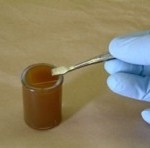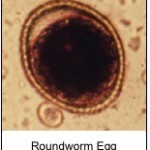Testing for Parasites involves a fecal flotation
What is a fecal flotation?
Fecal flotation is a routine veterinary test that is used to identify the presence of intestinal parasites or “worms”. The test actually detects the eggs of mature parasites that live in the intestine and pass their eggs to the outside in the host’s stool. Some of the parasites are worm-like, while others are simple single-celled organisms called protozoa.
How does the test work?
Stool material is mixed with a special solution that causes the parasite eggs to float to the surface. The eggs are collected from the surface of the liquid onto a glass slide, which is then examined under the microscope. If eggs are found, the type of parasite can be identified by the appearance of the eggs, while number of eggs present can often estimate the severity of the infection.
What sample is needed?
A small amount of fresh stool, about a 1″ section, is all that is needed; ideally the stool sample should be no more than 24 hours old. The stool sample should be as free as possible of grass, gravel, kitty litter, etc. The sample can be collected in any clean container with a tightly fitting lid; this may be a container brought from home, such as a clean margarine tub, or a container provided by your veterinarian.
When should fecal flotation be done?
Kittens and puppies are more likely to be infected with intestinal parasites than adult pets, and are also more prone to re-infection. Frequent stool checks are recommended for young pets, and pet owners should bring a stool sample to each of the initial series of visits for vaccinations. Additional testing may be recommended if a pet is found to be infected with parasites, develops diarrhea, or fails to gain weight as expected. Mature pets are less likely to be infected with parasites, and a routine fecal flotation test at the time of annual vaccination is usually sufficient for monitoring and maintenance of the healthy pet. However, if a pet develops diarrhea of unknown cause, exhibits unexplained weight loss, or has a history of prior parasitic infections, additional fecal testing will often be recommended.
Does the test work every time?
Fecal flotation is a simple test, and may fail to detect infection in certain situations. Sometimes the worms in the intestine are too young to produce eggs. If eggs are not present in the stool, then the infection will not be detected. This is most likely to happen in young pets, and is one of the reasons for doing multiple tests in puppies and kittens. In other situations, if the infection is mild and there are only a few mature parasites in the intestine, then the number of eggs in the stool sample may be too low to be detected. In these pets, the fecal flotation may be negative even though parasites are present. Also there are some parasites that just cannot be detected with fecal flotation. If the fecal flotation is negative and the veterinarian still suspects there is a problem with parasites, repeat fecal flotation may be recommended, or a totally different method of searching for the parasites may be used (fecal wet mount, concentration methods, fecal Baermann etc.).
This client information sheet is based on material written by Kristiina Ruotsalo, DVM, DVSc, Dip ACVP & Margo S. Tant BSc, DVM, DVSc. © Copyright 2004 Lifelearn Inc. Used with permission under license. September 29, 2008
 |
 |
||||
| Performing a Fecal Floatation | |||||
 |
PARASITE UPDATE:
Humans are vulnerable to raccoon roundworm Baylisascaris Raccoons are becoming more prevalent in all our urban & rural areas, living closer to homes and parks. But they’re sharing more with humans than the backyard & discarded food. They are sharing Baylisascaris . 9 out of 10 juvenile raccoons carry the intestinal roundworm Baylisascaris. These infected raccoons reside throughout Canada. Dogs living near these raccoons can contract the disease by eating the infected animal, soil, or feces. Infected dogs ( as well as the raccoons) then spread feces throughout the soil, making Baylisascaris easy for young children to pick up just by licking dirty fingers.
Q. What are the implications?
- People can be infected by ingesting eggs from soil, water or objects can have been contaminated with feces.
- Raccoons with Baylisascaris can shed MILLIONS of eggs per day, and the number required for transmission is relatively low. *Infants & Young Children as especially at risk because they explore the environment with their mouthes.
- Fewer than 25 human cases have been diagnosed and reported in the US as of 2003. 5 were fatal.
- Toronto is home to one of North America’s largest raccoon populations.
- In 2005, a 7 year old Toronto boy was infected with Baylisascaris while playing in a sandbox, and lapsed into a near fatal semi-comatose state
- Many physicians are NOT FAMILIAR with Baylisascaris.
Health Effects:
- Nausea
- Blindness
- Coma
- Tiredness
- Loss of muscle control
- Death
If you have any concerns regarding your pets health please consult your veterinarian immediately.



